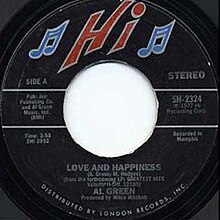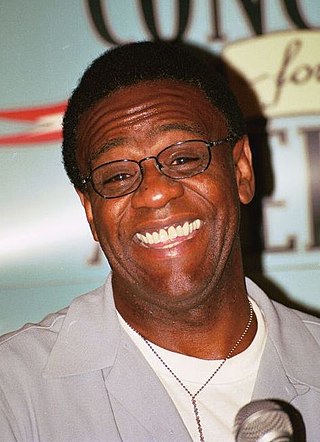
Albert Leornes Greene, known professionally as Al Green, is an American singer, songwriter, pastor and record producer best known for recording a series of soul hit singles in the early 1970s, including "Take Me to the River", "Tired of Being Alone", "I'm Still in Love with You", "Love and Happiness", and his signature song, "Let's Stay Together". After his girlfriend died by suicide, Green became an ordained pastor and turned to gospel music. He later returned to secular music.

James Chambers, OM, known professionally as Jimmy Cliff, is a Jamaican ska, rocksteady, reggae and soul musician, multi-instrumentalist, singer, and actor. He is the only living reggae musician to hold the Order of Merit, the highest honour that can be granted by the Jamaican government for achievements in the arts and sciences.
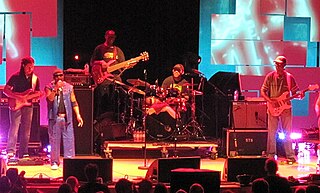
The Maytals, known from 1972 to 2020 as Toots and the Maytals, are a Jamaican musical group, one of the best known ska and rocksteady vocal groups. The Maytals were formed in the early 1960s and were key figures in popularizing reggae music.
"54-46 " is a song by Fred "Toots" Hibbert, recorded by Toots and the Maytals, originally released on the Beverley's label in Jamaica and the Pyramid label in the UK. A follow-up version released a year later, "54-46 Was My Number", was one of the first reggae songs to receive widespread popularity outside Jamaica, and is seen as being one of the defining songs of the genre. It has been anthologised repeatedly and the titles of several reggae anthologies include "54-46" in their title.
Mabon Lewis "Teenie" Hodges was an American musician known for his work as a rhythm and lead guitarist and songwriter on many of Al Green's soul hits, and those of other artists such as Ann Peebles and Syl Johnson, on Hi Records in the 1970s. His credits as a songwriter include "Take Me to the River", "Love and Happiness", "L-O-V-E (Love)", and "Here I Am ".

Christopher Percy Gordon Blackwell OJ is a Jamaican-British former record producer and the founder of Island Records, which has been called "one of Britain's great independent labels." According to the Rock and Roll Hall of Fame, to which Blackwell was inducted in 2001, he is "the single person most responsible for turning the world on to reggae music." Variety describes him as "indisputably one of the greatest record executives in history," while Barron's has described him as "a contender for most interesting man in the world."

Let's Stay Together is the fourth studio album by soul singer Al Green. Released in 1972, as the follow-up to his moderate success, Al Green Gets Next to You, it was recorded at Royal Recording Studio in Memphis, Tennessee. A commercial success, it peaked at number eight on the pop albums chart and became the first of six consecutive Green albums to peak at number one on the soul album chart, where it held the position for ten straight weeks.

Frederick Nathaniel "Toots" Hibbert, was a Jamaican singer and songwriter who was the lead vocalist for the reggae and ska band Toots and the Maytals. A reggae pioneer, he performed for six decades and helped establish some of the fundamentals of reggae music. Hibbert's 1968 song "Do the Reggay" is widely credited as the genesis of the genre name reggae. His band's album True Love won a Grammy Award in 2005.

Marcia Llyneth Griffiths is a Jamaican singer best known for the 1989 remix of her single "Electric Boogie", which serves as the music for the four-wall "Electric Slide" line dance. It is the best-selling single of all time by a female reggae singer.

Al Green Explores Your Mind is the eighth album by soul singer Al Green. Unlike previous Al Green albums, this album featured only one major hit, the U.S. No. 7 hit "Sha-La-La ", but did contain the original version of "Take Me to the River", a song which went to No. 26 on the Billboard chart when covered by Talking Heads in 1978. In 2004, the song "Take Me to the River" was ranked number 117 on Rolling Stone's list of the 500 greatest songs of all time.
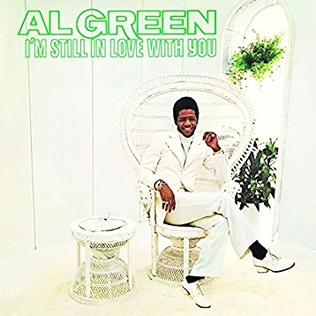
I'm Still in Love with You is the fifth studio album by the American gospel and soul singer Al Green, released on October 23, 1972, on Hi Records. Recording sessions took place during 1972. The album was produced solely by Willie Mitchell. The album peaked at number four on the US Billboard 200 and number one on the US Top R&B/Hip-Hop Albums and produced four singles: "Love and Happiness" which was rated ninety-eight on Rolling Stones's 500 Greatest Songs of All Time as well as "I'm Still in Love with You" and "Look What You Done for Me" which were top five hits on the US Pop Chart. In 2003, the album was ranked number 285 on the 500 greatest albums of all time by Rolling Stone, 286 in a 2012 revised list, and number 306 in a 2020 revised list. The introductory drum break to the album's second track, "I'm Glad You're Mine", was sampled by The Notorious B.I.G. in his later-posthumous single "Dead Wrong".
"Take Me to the River" is a 1974 song written by singer Al Green and guitarist Mabon "Teenie" Hodges. Hit versions were recorded by Syl Johnson, Talking Heads and Delbert McClinton. In 2004, Green's original version was ranked number 117 on Rolling Stone magazine's list of the Rolling Stone's 500 Greatest Songs of All Time. Green's 1974 recording was inducted into the Grammy Hall of Fame in 2011.
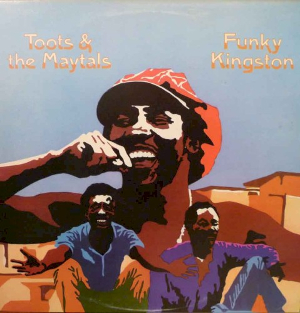
Funky Kingston is the name of two albums by Jamaican reggae group Toots and the Maytals. The first was issued in Jamaica and the United Kingdom in 1973 on Dragon Records, a subsidiary label of Island Records, owned by Chris Blackwell. A different album, with the same cover and title, was issued in the United States in 1975 on Mango Records. That album was compiled from three previous Maytals albums by Island Records employee Danny Holloway and peaked at #164 on the Billboard 200. It was also voted the eleventh best album of 1975 in the annual Jazz & Pop poll. In 2003, the American version was placed at number 378 on Rolling Stone's list of The 500 Greatest Albums of All Time, 380 in a 2012 revised list and 344 in a 2020 revised list.
"Pressure Drop" is a song recorded in 1969 by the Maytals for record producer Leslie Kong. The song appears on their 1970 album Monkey Man and From the Roots. "Pressure Drop" helped launch the band's career outside Jamaica when the song was featured on the soundtrack to the 1972 film The Harder They Come, which introduced reggae to much of the world. In 2004, Rolling Stone rated the song No. 453 in its list of the 500 Greatest Songs of All Time. This song has been covered often, most notably by Robert Palmer, the Specials, Keith Richards, Izzy Stradlin and the Ju Ju Hounds, the Oppressed and the Clash. It is also featured in the soundtrack for MLB The Show 23.
This discography includes albums and singles released by the American soul singer Al Green.
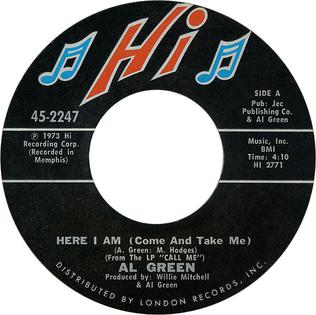
"Here I Am (Come and Take Me)" is a 1973 song by Al Green, the second single released from his album Call Me. The song reached number 10 on the Billboard Hot 100 and number two on the Hot Soul Singles chart. It was certified as a gold record by the Recording Industry Association of America.
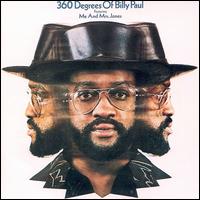
360 Degrees of Billy Paul is an album by soul singer Billy Paul. It was produced by Kenny Gamble and Leon Huff and arranged by Bobby Martin, Lenny Pakula and Norman Harris. Released in 1972, it includes the Grammy Award-winning number 1 pop and soul single "Me and Mrs. Jones" and its follow-up "Am I Black Enough for You?" which reached number 29 on the soul chart and number 79 on the pop chart. The album was expanded and remastered by Big Break Records for compact disc in 2012 with three bonus tracks, new liner notes by Andy Kellman, and new quotes from Billy Paul.

Paul Douglas is a Jamaican musician, best known for his work as the drummer, percussionist and bandleader of Toots and the Maytals. His career spans more than five decades as one of reggae's most recorded drummers. Music journalist and reggae historian David Katz wrote, "dependable drummer Paul Douglas played on countless reggae hits."
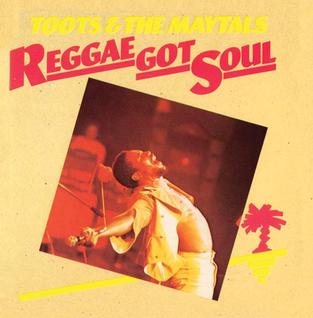
Reggae Got Soul is an album by the Jamaican reggae group Toots and the Maytals, released in July 1976 by Island Records.

Toots in Memphis is an album by the Jamaican musician Toots Hibbert. Released in 1988, Toots in Memphis was recorded without the Maytals. The majority of the album's tracks are covers of American R&B songs.
